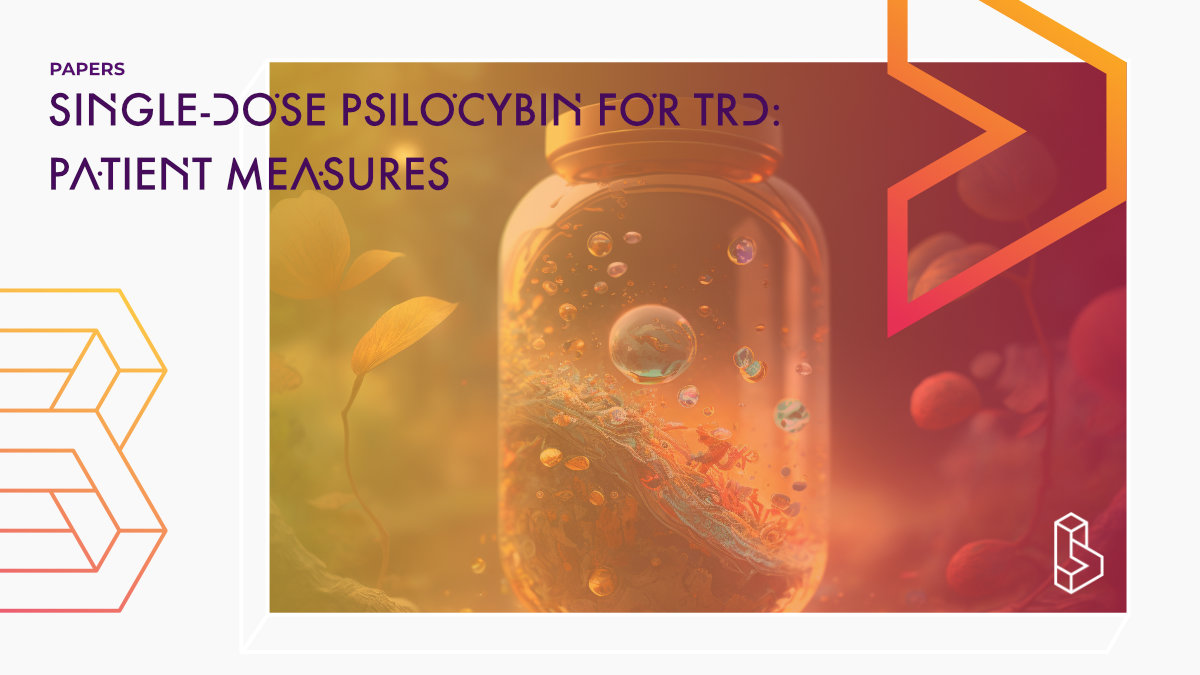This re-analysis of the COMPASS Phase IIb RCT with psilocybin (25/10/1mg; COMP360) finds significantly higher scores on patient-reported depression severity, anxiety, positive affect, functioning, quality of life, and cognitive function. Though the main finding of the study was less impressive than hoped, all patient-reported measures show that the high dose of psilocybin (25mg) led to better outcomes.
Abstract
“Background COMP360 is a proprietary, synthetic formulation of psilocybin being developed for treatment-resistant depression (TRD), a burdensome, life-threatening illness with high global impact. Here, we expand upon the previous report of primary outcomes from a phase 2 study of COMP360 in individuals with TRD—the largest randomised controlled clinical trial of psilocybin—to discuss findings of the exploratory efficacy endpoints.
Methods In this phase 2, double-blind trial, 233 participants with TRD were randomised to receive a single dose of psilocybin 25 mg, 10 mg, or 1 mg (control), administered alongside psychological support from trained therapists. Efficacy measures assessed patient-reported depression severity, anxiety, positive and negative affect, functioning and associated disability, quality of life, and cognitive function.
Results At Week 3, psilocybin 25 mg, compared with 1 mg, was associated with greater improvements from Baseline total scores in all measures. The 10 mg dose produced smaller effects across these measures.
Limitations Interpretation of this trial is limited by the absence of an active comparator and the possibility of functional unblinding in participants who received a low dose of psilocybin.
Conclusions Three weeks after dosing, psilocybin 25 mg and, to a lesser degree, 10 mg improved measures of patient-reported depression severity, anxiety, affect, and functioning. These results extend the primary findings from the largest randomised clinical trial of psilocybin for TRD to examine other outcomes that are of importance to patients.”
Authors: Guy M. Goodwin, Scott T. Aaronson, Oscar Alvarez, Merve Atli, James C. Bennett, Megan Croal, Charles DeBattist, Boadie W. Dunlop, David Feifel, David J. Hellerstein, Muhammad Ishrat Husain, John R. Kelly, Molly R. Lennard-Jones, Rasmus W. Licht, Lindsey Marwood, Sunil Mistry, Tomas Palenícek, Ozlem Redjep, Dimitris Repantis, Robert A. Schoevers, Batya Septimus, Hollie J. Simmons, Jair C. Soares, Metten Somers, Susan C. Stansfield, Jessica R. Stuart, Hannah H. Tadley, Nisha K. Thiara, Joyce Tsai, Mourad Wahba, Sam Williams, Rachel I. Winzera, Allan H. Young, Matthew B. Young, Sid Zisook & Ekaterina Malievskai
Summary of Single-dose psilocybin for a treatment-resistant episode of major depression: Patient-scores
Major depressive disorder (MDD) is experienced by 280 million people globally, and one-third of people with MDD progress to treatment-resistant depression (TRD). There are no consistently effective treatment approaches, and the risk of relapse increases with successive courses of treatment.
People with treatment-resistant depression (TRD) have a higher disease burden, lower quality of life, and a higher likelihood of unemployment. New treatment approaches are needed, and the therapeutic potential of drugs producing a psychedelic experience is being explored.
Study details
Compounds studied
Psilocybin
Topics studied
Treatment-Resistant Depression
Depression
Study characteristics
Placebo-Controlled
Active Placebo
Double-Blind
Randomized
Re-analysis
Participants
233
Humans
Institutes
Institutes associated with this publication
COMPASS PathwaysCOMPASS Pathways is a publicly listed company (NASDAQ) that is developing psilocybin for treatment-resistant depression (TRD) for which it has completed a successful Phase IIb trial. COMPASS is one of the largest psychedelic companies and has received substantial investment from atai.
Compound Details
The psychedelics given at which dose and how many times
Psilocybin 25 mg | 1xLinked Research Papers
Notable research papers that build on or are influenced by this paper
Single-Dose Psilocybin for a Treatment-Resistant Episode of Major DepressionThis double-blind active-placebo controlled trial (n=233) tested the effect of a single dose of psilocybin (25/10/1mg) with supportive therapy for treatment-resistant depression. The primary endpoint at three weeks finds a significant reduction in depressive symptoms (MADRS, 12-point drop from baseline of 32) that was significantly greater in the 25mg group vs the 1mg (placebo) group (6.6 points larger drop). The response (>50% drop in MADRS score) in the 25mg group dropped from 37% at 3 weeks to 20% at 12 weeks.

